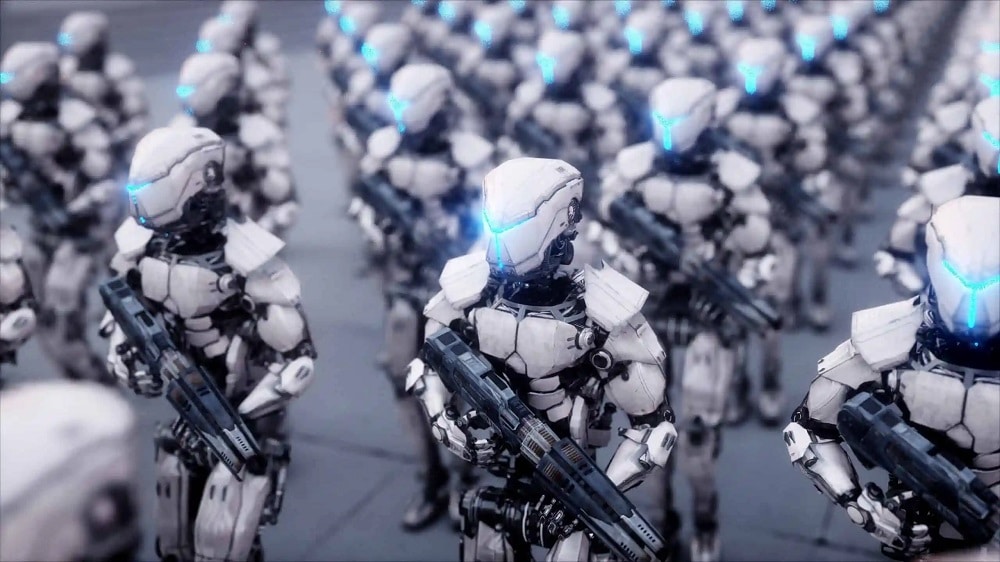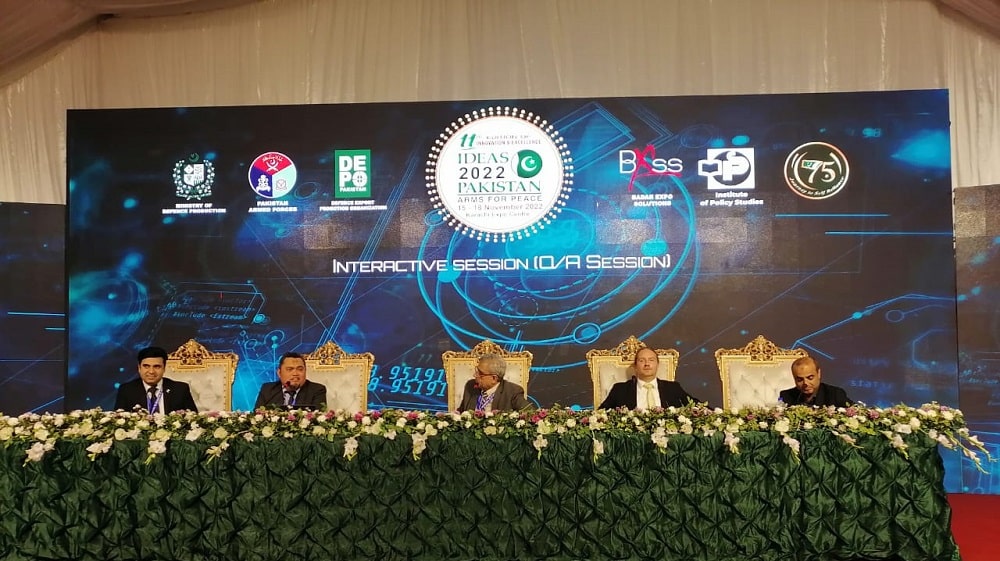Future warfare would see Artificial Intelligence (AI) as the third revolution in warfare being utilized with minimal adverse impact.
This augments the implications of AI on national security, military tactics, and defense strategies as almost 70-75% of global defense leaders believe that AI will be very or extremely important to organizational strategies and in bearing outcomes.
This was highlighted during the first day of a seminar titled ‘Artificial Intelligence (AI) in Defence Market; A Paradigm Shift in Military Strategy and National Security’, which was organized at Expo Centre, Karachi, on November 15, 2022, as part of IDEAS 2022 in joint-collaboration of Institute of Policy Studies (IPS), Islamabad, and Defence Export Promotion Organization (DEPO).
The seminar, which was moderated by Prof. Dr. Syed Irfan Hyder, Vice Chancellor, Ziauddin University, was graced as Chief Guest by Lt Gen (r) Humayun Aziz, HI (M), Secretary, Ministry of Defence Production, and addressed by Major General Muhammad Arif Malik, HI (M), DG DEPO, Lars G. A. Hilse, a German scholar and global thought leader in the field of digital strategy and cyber security, Dr. Sigit Jarot, CEO Cloudtech and Head of Infrastructure, MASTEL, Indonesia, Dr. Yasar Ayaz, CPD/Chairman, National Center of Artificial Intelligence (NCAI), and Dr. Jawwad Shamsi, Dean, FAST NUCES Faculty of Computer Sciences.
The event was attended by various foreign dignitaries, high-rank government officials, ministries, academics, think tanks, representatives from public and private industries, and law experts.
With Artificial Intelligence having different dimensions of application, Lt Gen (r) Humayun Aziz termed it as an aspirational goal, a game changer, and a transformative national security technology that is opening up several prospects of military success as well as threats to defense and security. Hence, demanding a holistic approach to better cater to prospects and curtail emerging menaces.
He stated that three major areas of national security which would see a significant impact from the increasing developments in AI are military superiority, information superiority, and economic superiority through data, data-driven technologies, machine learning technology, network technologies, and cyber defense technology, etc.
Regarding the future dynamics of the international security environment and strategic shifts in defense, he noted that these are dependent on AI and AI-driven applications, which have now become key pillars of states. However, these developments would not curtail the significance and reliance on conventional capabilities in mitigating and combating threats.
He further maintained that the transformation of warfare through AI, along with biotech, strategic weaponry, and computers, would increase armed forces’ readiness and bring a paradigm shift in modern warfare and the security apparatus of states.
Highlighting the globalization of weapon systems and advancements in AI, Maj. Gen. Arif emphasized that new technologies have ushered increased opportunities, demands, and investments in the development of AI-integrated systems in the defense and security domain.
He advocated for building awareness for the use of AI and AI research in the fields of intelligence collection and analysis, logistics, robotics, cyber missions, information operations, C2, and autonomous weaponry for better incorporation of AI into real-world military operations globally.
Emphasizing the importance of investing in AI, he underlined that AI is changing not only the living styles, employment performances, people-to-people interaction, learning, and decision-making of people as well as the operational and business environment of organizations but also military tactics and warfare.
In this regard, significant capitalization of AI has been seen in hybrid, cyber, and network-centric warfare. As put by Lars Hilse, the current AI applications in hybrid warfare through fake news, misinformation, disinformation, cyber-physical attacks on civilian infrastructure, opinion manipulation, and adversarial reconnaissance and intelligence gathering triggers civil unrest and have serious security and economic implications.
Similar is the case with the use of AI in cyber security which demands a defense approach and practical steps towards a robust security framework based on identification and prioritization of critical infrastructure, efficient legislature, regular stress and penetration tests, continuous vulnerability testing (CVT), and multi-layered neural networks, he outlined.
5G Network Centric Warfare (NCW), as underlined by Sigit Jarot, is increasingly becoming relevant as information and AI-driven technologies are employed to gain information advantage to convert it to a competitive advantage.
He further noted that future battles would entail the weaponization of 5G; therefore, it calls for an approach to study and develop 5G for future military endeavors including 5G military decision-making, 5G smart warehousing, 5G distributed C2, 5G AR/VR, 5G for tactical millimeter wave networks, 5G non-terrestrial networks, proximity services (ProSe), and 5G geo-intelligence.
Apart from these applications, 5G is also going to make a mark in the defense market so much so that it is expected to reach $76, 014.64 million by 2030 with a compound annual growth rate of 67.7% (2021-2030).






















